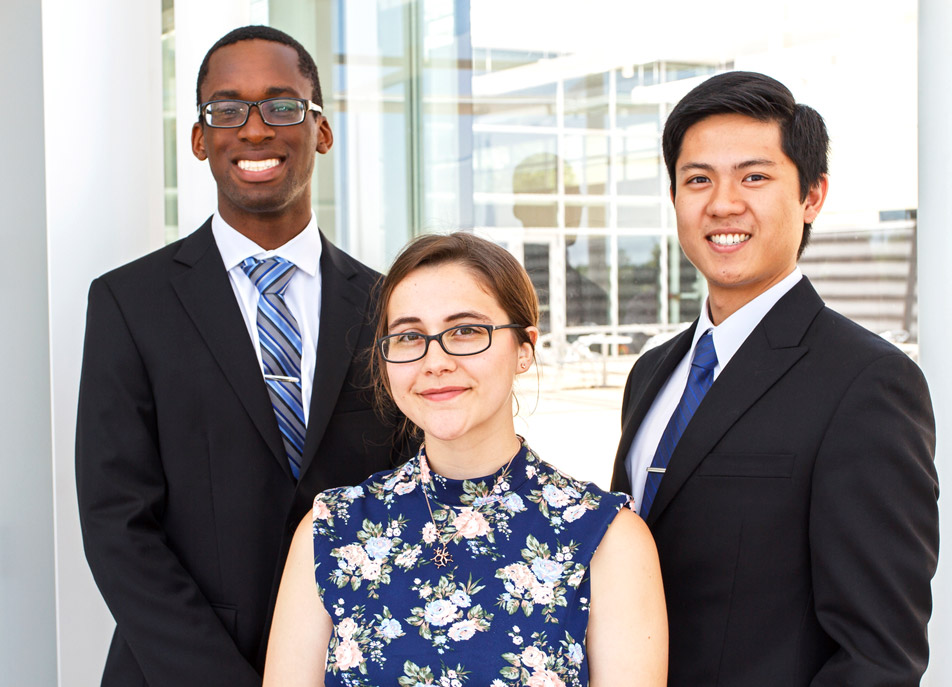Now in their ninth year, the Undergraduate Research Scholar Awards continue to support and encourage a wide variety of student work through the UT Dallas Office of Research.
After working for a few months on projects with faculty mentors — whose expertise ranges from fundamental science and industry-centered projects to social science and business — more than 80 students presented their research to a panel of faculty judges at the Undergraduate Research Poster Contest in mid-April .
Raytheon sponsored the April 27 final competition, where the work of 18 finalists was judged by nine professionals in industry, venture development and health care.
Contest judge Rod Naphan, chief technology officer and senior vice president at Fujitsu Network Communications, said the quality of the work presented this year was “outstanding” for the undergraduate level.
“I really thought I was looking at graduate student papers,” Naphan said. “What’s unique is the amount of fundamental research at the undergraduate level, rather than at the graduate level, where your research is culminating in a dissertation.”
From Prosthetic Legs to Consumer Behavior
Students from five UT Dallas schools were represented: the School of Behavioral and Brain Sciences; the School of Economic, Political and Policy Sciences; the Erik Jonsson School of Engineering and Computer Science; the Naveen Jindal School of Management; and the School of Natural Sciences and Mathematics.
Student research topics included the improvement of prosthetic legs, an evaluation of consumer behavior models, an investigation of bacterial immune systems, an examination of the use of traditional medicine in Costa Rica and the use of mutations in bacterial proteins to study evolutionary processes.
Dr. Claire Aldridge, vice president for venture development at Remeditex Ventures, which invests in early stage life-science companies, said the clarity with which the finalists explained their research to her and the other judges was impressive.
“I had conversations with some of the students about the potential for commercialization, and what I really liked was that they were actually thinking about what the plan would be to try to get their work into the marketplace, where it could actually benefit people,” she said. “That’s a very mature outlook, and it was very impressive. The fact that they’re thinking about that shows a lot of insight into the ultimate value of research.”
Undergraduate Research Poster Contest Finals
First place: Sheridan Cavalier, neuroscience junior, School of Behavioral and Brain Sciences
Second place: Anthony Dao, biology senior, School of Natural Sciences and Mathematics
Third place: Hans Ajieren, electrical engineering sophomore, Erik Jonsson School of Engineering and Computer Science
Contest Judges
Dr. Claire Aldridge, vice president for venture development, Remeditex Ventures
Dr. David Brown, president of medical staff, the Heart Hospital Baylor Plano
Steve Coutoumanos, director of product management, Dell
Souvik Das, managing vice president of engineering and chief technology officer, Capital One Auto Finance
Todd Edwards, engineer, Raytheon
John Ellis, senior manager, NEC Corporation of America
Craig Lee, director, AT&T Foundry
Sha-Chelle Manning, director of corporate innovation, Pioneer Natural Resources
Rod Naphan, chief technology officer and senior vice president, Fujitsu Network Communications
Sheridan Cavalier, a neuroscience junior, won first place for her research involving protein activity in regions of the brain that modulate fear.
“We used a rat model of autism to study the molecular basis of impaired learning,” said Cavalier, who worked in the lab of Dr. Christa McIntyre, associate professor of neuroscience.
Second place went to Anthony Dao, a biology senior. His research project resulted from a meeting during Match Day, an annual event that encourages prospective student investigators to talk with faculty about research opportunities on campus. Dao paired with Dr. Jie Zheng, associate professor of chemistry and biochemistry, whose research focuses on using tiny nanoparticles for biological and medical studies.
“Nanoparticles are really interesting because they can be used for imaging probes, and some can be used to carry drugs to cells,” Dao said. “In this study, we wanted to see whether we could increase the rate at which gold nanoparticles were taken up by cells.”
Hans Ajieren, a Eugene McDermott Scholar and sophomore in electrical engineering, has worked on different aspects of the same project for two years. Under the guidance of Dr. Walter Voit BS’05, MS’06, assistant professor of materials science and engineering, Ajieren has been using shape memory polymers to improve the insertion of cochlear implants. He earned third place at the poster contest for his work on an automated method for inserting the device into the ear.
“In addition to improving the medical aspects of cochlear implants, I’m also interested in decreasing the cost to help make this a technology that’s available to more people,” Ajieren said.
Judge Sha-Chelle Manning, director of corporate innovation at Pioneer Natural Resources, said the University’s researchers and their students are tuned in to the needs of business and industry.
“At UT Dallas, there is a group of researchers that are really focused on creating the engineering and science that solve industry problems,” she said. “You see that coming through in the student projects, too. It’s very much an applied research mentality that’s focused on how you deliver a product.”




